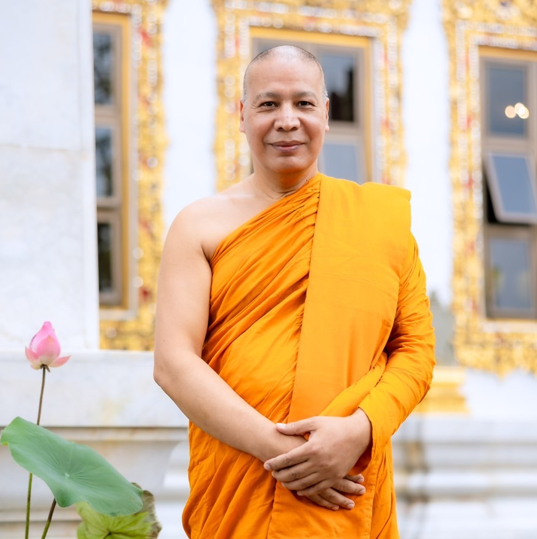
Venerable Phra Anil Sakya, PhD.
(Royal Title: Phra Dhammashakyavamshavisuddhi)
Venerable Phra Anil Sakya received his MPhil from Cambridge University and later obtained a PhD in Social Anthropology from Brunel University in the UK with a royal scholarship from the late King Bhumibol Adulyadej of Thailand. Since 2000, he has been lecturing in various capacities. While serving as a Vice-President and lecturer at Mahamakut Buddhist University, he was also a visiting professor at numerous leading universities in Thailand, as well as at Santa Clara University in the USA and Oxford University in the UK. In addition to his university lectures, he has been frequently invited to speak to top Thai government administrators and the business community, and to address global issues at UN organizations.
Recently, he has spoken on various global issues at several notable events, including:
- The 5th Asia-Pacific Roundtable Meeting: International Conference for Holistic Education (2017) in Bangkok
- The 8th UNESCO Workshop on Bioethics, Multiculturalism, and Religion (2022) in Bangkok
- The SEACHA Conference on ‘Cultural Wisdom for Climate Action’ (2023) in Bangkok
- The Gandhara Symposium on Cultural Diplomacy: Reviving Gandhara Civilization and Buddhist Heritage in Pakistan (2023)
- The ASEAN Conference on Interreligious and Intercultural Dialogue (2023) in Indonesia
- The ASEAN Business & Investment Summit in Indonesia (2023)
- The Future of the Universal Declaration of Human Rights at Princeton University, USA (2023)
- The 23rd Annual International Conference on Islamic Studies, Indonesia (2024)
- The 12th General Assembly of ABCP in New Delhi (2024)
He has retired from university in 2022. Prior to his retirement, he advised many PhD students. He represents the modern face of Buddhism, bridging the principled authority of the monastic tradition with the ever-changing realities of secular existence.
The illiterate of the 21st century will not be those who cannot
read and write, but those who cannot learn, unlearn and relearn.
(Alvin Tofler, Future Shock)
Education stands as the cornerstone of societal progress, molding individuals to become assets to their communities and beyond. Yet, amidst a surge in regional, ethnic, and religious conflicts, humanity finds itself embroiled in internal strife. Additionally, the pillars of modernism, such as education, have succumbed to narrow economic interests, leading to a widening chasm between the affluent and the disadvantaged, a decline in cultural richness, and the erosion of sustainable livelihoods. An insatiable drive for economic expansion jeopardizes environmental conservation efforts and, in turn, threatens our very existence.
As we navigate deeper into the third decade of the twenty-first century, it’s evident that a significant disparity exists between the activities within schools and the realities of the world outside their confines. The rapid emergence of new technologies has revolutionized both work and social dynamics, reshaping the fabric of our daily existence. However, despite these profound changes, schools seem entrenched in tradition, holding fast to a curriculum designed for a past era with vastly different demands and aspirations. This misalignment is starkly apparent in the conflicting messages conveyed by what schools teach and value versus the upbringing provided by families. The disruption in society has been tremendous. The children attending our schools today, born at the dawn of the twenty-first century and those born after 1996, are known as the ‘centennial generation.’ Their lives are deeply intertwined with digital technology and AI, and they communicate through various modes using materials composed of bits and bytes. Current education reduces the quality of being a human. The traditional way of communication between parents and children has also changed. Nowadays, many parents lack the patience to answer their children’s inquiries and often resort to raising them with cellphones or tablets. Children, in turn, spend much of their time playing various games and watching TikTok, resulting in reduced human interaction. Both the traditional curriculum in schools and the digital upbringing at home stifle the creativity of centennials. They are living in a virtual world rather than engaging with the real human world. Consequently, we are raising our centennials with increased anxiety, depression, and impatience. We are hindering their natural capacity for enlightenment and true humanity. This paper explores holistic education for humanity and the concept of planting the seed of enlightenment from the start. By examining current educational practices, proposing innovative approaches, and discussing the long-term benefits of an enlightenment-focused education system, we aim to provide a comprehensive framework for educators and policymakers.